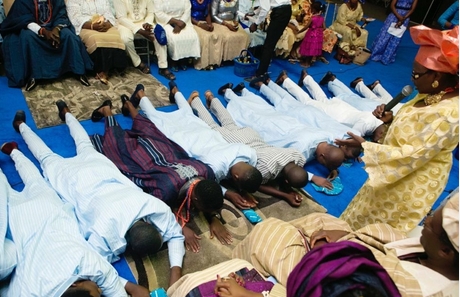
support@yorubalibrary.com
+2348073529208, 07038599574

Marriage is a significant and elaborate affair in Yoruba culture, marked by various traditional rites and ceremonies. The role of the bride's family is crucial in these proceedings, reflecting the community's values, customs, and respect for familial bonds. Understanding these roles provides a deeper insight into the rich cultural heritage of the Yoruba people.
Initial Courtship and Introduction
The process begins with the courtship and formal introduction. Once the groom expresses his interest in the bride, his family sends representatives to the bride's family to formally introduce themselves and state their intentions. During this visit, the bride's family welcomes the groom's representatives and engages in discussions about the potential union.
Engagement Ceremony (Ìdáná)
The engagement ceremony, or Ìdáná, is a colorful and joyous event where both families come together to celebrate the impending marriage. The bride's family plays a central role in this ceremony, which includes several key elements:
• Presentation of Gifts: The groom's family presents a list of items, known as "Ẹ̀bùn Ìyàwó," to the bride's family. These gifts often include money, clothing, food items, and other symbolic offerings that signify the groom's respect and appreciation for the bride and her family.
• Acceptance of Gifts: The bride's family inspects the gifts and, if satisfied, accepts them as a sign of their approval of the union. This acceptance is an important step in solidifying the relationship between the two families.
Dowry (Owo Ori)
The payment of dowry, is a significant aspect of Yoruba marriage rites. The dowry is a token of appreciation from the groom to the bride's family for raising their daughter. The amount and items included in the dowry are often agreed upon during the initial discussions between the families. The bride's family uses this occasion to further evaluate the groom's commitment and sincerity.
Traditional Wedding Ceremony (Ìgbéyàwó)
The traditional wedding ceremony, known as Ìgbéyàwó, is the culmination of the marriage rites. The bride's family hosts the event, which includes various traditional practices and rituals:
• Blessings and Prayers: Elders from the bride's family offer blessings and prayers for the couple, wishing them a prosperous and harmonious marriage.
• Tying of Knots: In some Yoruba communities, the bride's family performs a symbolic act, such as tying knots or joining hands, to signify the binding of the couple's lives.
• Feasting and Celebration: The ceremony is followed by a grand celebration with music, dance, and feasting. The bride's family ensures that all guests are well entertained and taken care of.
Post-Wedding Customs
Even after the wedding, the bride's family continues to play a supportive role. They offer guidance and support to the new couple, helping them navigate the early stages of their marriage. The relationship between the bride's and groom's families is expected to be harmonious and mutually respectful, fostering a sense of extended family and community.
Conclusion
The role of the bride's family in Yoruba marriage rites is multifaceted and deeply rooted in tradition. From the initial courtship to the grand wedding ceremony, the bride's family ensures that the marriage process honors cultural values and strengthens familial bonds. Their involvement is a testament to the communal and supportive nature of Yoruba society, highlighting the importance of family in one of life's most significant milestones.

Learn about the Yoruba concept of Ìwà Pẹ̀lẹ́ (good…

Learn special praises for Divine Being and Creator…